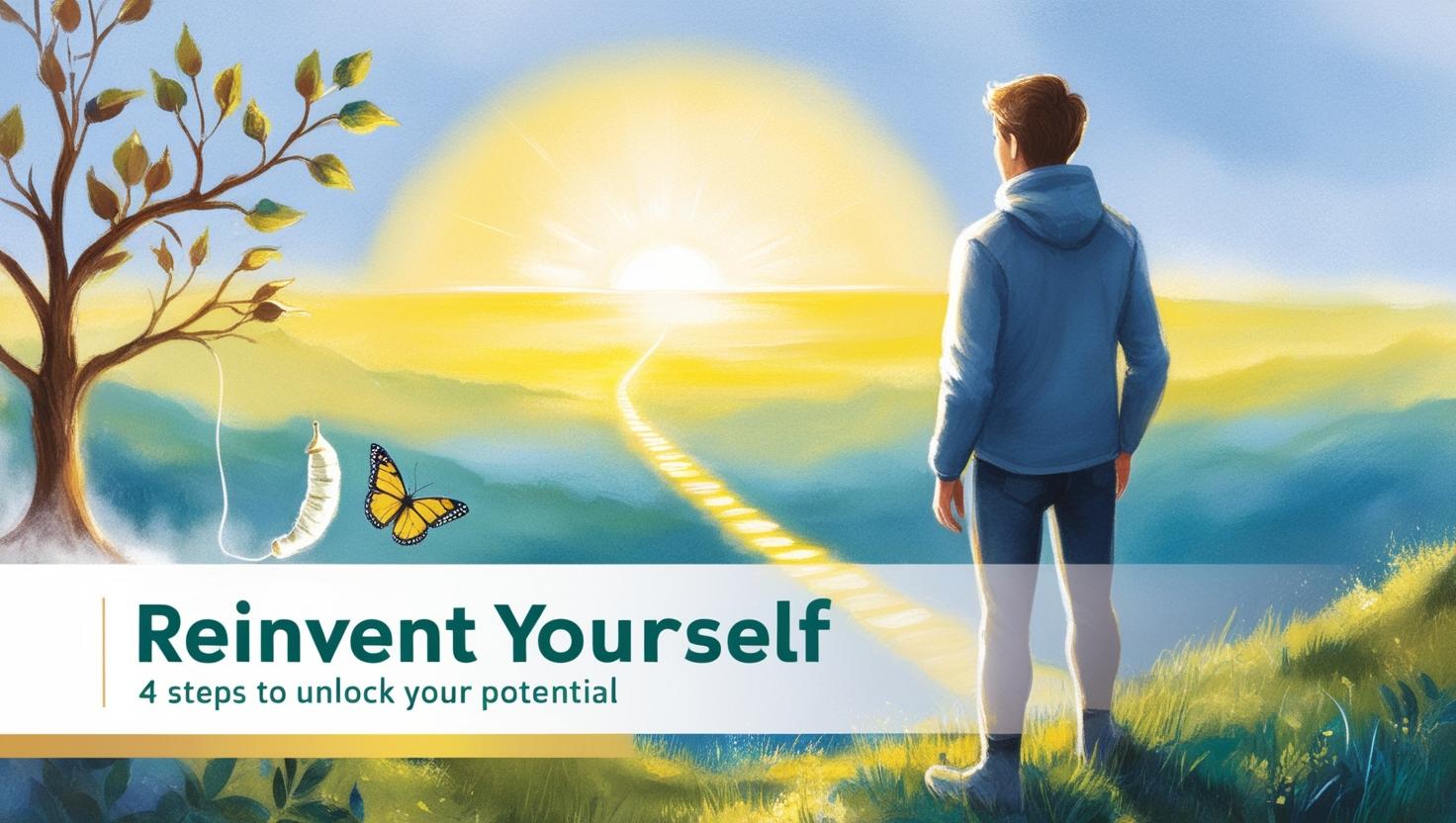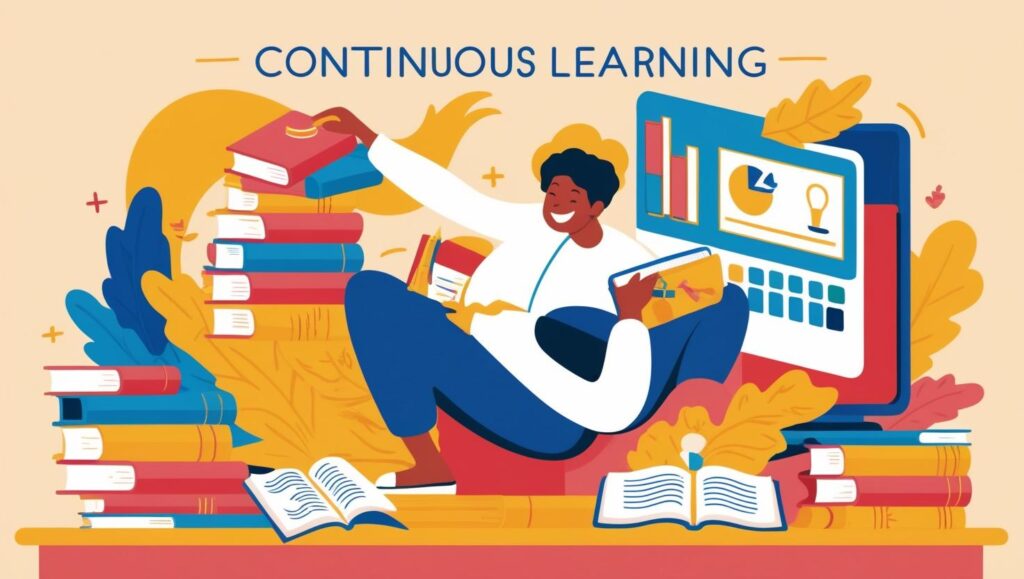Reinvent Yourself: 4 Steps to Realize Your Amazing Potential

Reinvent Yourself to overcome stagnation and discover new opportunities. Whether you’re seeking personal growth or a fresh perspective, this guide provides actionable steps to help you transform your life. By reinventing yourself, you unlock your true potential.
1. Recognizing the Need for Change
Change, though often feared, is an essential part of our life’s continuum.
To truly reinvent yourself, recognizing the need for change is vital. It’s a step that bridges self-awareness with actionable transformation. Let’s explore the key catalysts of this realization:
The Catalysts of Awareness
Transformation doesn’t happen in a vacuum. There’s always an undercurrent, a series of events, emotions, or realizations that accumulate over time, eventually leading to the awareness of a need for change. Let’s delve into these catalysts.
- Emotional Discontent:
Feelings of restlessness and stagnation often signal it’s time to reinvent yourself. These emotions are not setbacks but rather your mind’s nudge toward growth and new possibilities. - Yearning for More:
Aspirational drives push us to question our current state. Whether it’s the pursuit of purpose or self-actualization, these desires often lead to reinventing yourself by challenging comfort zones. - Life-Altering Events:
Significant life changes – such as a health scare or career setback – are opportunities to reflect and pivot. These events can be powerful motivators for personal reinvention, driving you to explore untapped potential.
The Role of Acceptance
Acceptance is a cornerstone in the process of reinventing yourself. By acknowledging the gap between where you are and where you want to be, you empower yourself to take actionable steps. True acceptance also enables you to move past denial and fear, providing the clarity needed to embrace meaningful transformation.
The Power of Realization
The moment you recognize the need for change is a turning point. This realization, when coupled with actionable insights, becomes the first tangible step toward reinventing yourself. It’s an internal shift where abstract feelings of unease transform into concrete understanding, lighting the path toward growth and fulfillment.
Recognizing the need for change is the foundation of self-reinvention. It’s a process that requires courage and self-awareness, but it’s also the gateway to unlocking your full potential. Reinventing yourself begins with honesty, reflection, and a commitment to creating the life you desire.

2. The Importance of Goal Setting
To truly reinvent yourself, setting clear and achievable goals is essential. Goals act as your personal North Star, providing direction and purpose as you navigate life’s complexities.
The Power of Vision
Envisioning your future self is the first step toward reinventing yourself. A clear vision serves as a motivational compass, guiding your actions toward fulfilling aspirations.
Characteristics of Effective Goals
Not all goals are created equal. For success in reinventing yourself, your goals should be:
- Specific: Define clear targets (e.g., “Lose 10 pounds in 3 months”).
- Measurable: Track progress to stay motivated.
- Achievable: Set realistic yet challenging objectives.
- Relevant: Ensure alignment with your core values.
- Time-bound: Set deadlines to maintain urgency and focus.
The Role of Flexibility
Life’s unpredictability requires adaptable goals. Adjust your objectives as circumstances evolve, ensuring your path to reinvention stays relevant and achievable.
Breaking It Down
Large goals can be daunting, but breaking them into smaller tasks makes the journey manageable and provides continuous motivation through incremental achievements.
Accountability and Reflection
Share your goals with someone you trust to maintain accountability. Regularly reflect on your progress, adapting as needed to stay aligned with your vision for reinventing yourself.
Goal setting is not just about achieving milestones; it’s about fostering self-awareness and growth. By establishing clear goals and committing to lifelong learning, you equip yourself for a transformative journey of self-reinvention.
To reinvent yourself, commit to lifelong learning. Explore new skills, attend workshops, and dive into resources like SMART Goals. The journey of self-improvement is ongoing, and learning keeps you evolving.

3. Seeking Mentorship and Guidance
The journey to reinvent yourself is challenging, and mentorship plays a critical role in navigating its complexities. A mentor’s guidance provides clarity, perspective, and accountability, all of which are essential in achieving self-reinvention.
The Essence of Mentorship
A mentor is more than just a guide—they offer:
- Perspective: Helping you view challenges from new angles.
- Encouragement: Boosting your confidence as you work to reinvent yourself.
- Accountability: Ensuring you stay committed to your goals.
- Networking: Connecting you to opportunities that align with your transformation.
Finding the Right Mentor
To succeed in reinventing yourself, consider these steps:
- Self-Assessment: Identify your goals and areas where mentorship is needed.
- Research: Seek mentors who align with your values and aspirations.
- Engage: Attend events to meet potential mentors.
- Direct Outreach: Reach out to individuals whose guidance you admire.
- Use Formal Platforms: Join mentorship programs that facilitate connections.
Beyond Formal Mentorship
Guidance can come from many sources when working to reinvent yourself:
- Books and Literature: Biographies and self-help books offer valuable lessons.
- Online Platforms: Articles, podcasts, and videos from thought leaders provide actionable insights.
- Peer Groups: Like-minded individuals offer mutual support and shared wisdom.
Reinvention is deeply personal, but the wisdom of others accelerates growth. Seek mentors, leverage peer guidance, and explore diverse resources to enrich your journey of reinventing yourself.
A strong network is essential for growth. Surround yourself with mentors and supportive peers who inspire and challenge you. Forbes on Mentorship offers great tips for finding the right guidance.

4. Embracing Continuous Learning
In an age where change is the only constant, the ability to learn and adapt becomes more than just a valuable skill—it becomes a survival trait. Whether it’s technological advancements, shifts in societal values, or the myriad transformations in between, those who remain static risk obsolescence. Embracing continuous learning is the key to personal and professional growth, ensuring that we remain relevant, resilient, and ready to navigate the challenges of our ever-shifting world. Let’s explore the dimensions of continuous learning and its paramount significance in our lives.
The Lifelong Learning Philosophy
Continuous learning isn’t merely about acquiring new knowledge; it’s a mindset, a philosophy. It stems from a profound belief that learning doesn’t cease with formal education or a certain age. It’s an ongoing, lifelong journey. By cultivating this perspective:
- Adaptability: You become more agile and flexible, ready to handle the uncertainties and volatilities of the modern world.
- Relevance: You ensure your skills and knowledge remain pertinent in an ever-evolving landscape.
- Personal Growth: You enrich your life experiences, broadening your horizons, and deepening your understanding of the world and yourself.
Avenues for Continuous Learning
With the digital revolution, the avenues for learning have exploded. Here are some routes you can consider:
- Formal Education: Whether it’s pursuing a higher degree, specialized courses, or professional certifications, formal education offers structured and comprehensive learning experiences.
- Online Courses: Platforms like Coursera, Udemy, and Khan Academy have democratized learning. You can access courses from top universities and experts from the comfort of your home.
- Workshops and Seminars: These provide focused learning experiences and the opportunity to network with peers and experts.
- Self-Reflection: It’s not always about external knowledge. Introspection, meditation, and journaling can lead to profound self-awareness and insights.
- Books and Literature: From classic literature to contemporary non-fiction, books remain a timeless source of wisdom.
- Peer Learning: Engaging in discussions, debates, or study groups with peers can offer diverse perspectives and deepen understanding.
- Travel: Experiencing new cultures, landscapes, and ways of life can be incredibly enlightening.
Barriers to Continuous Learning (and Overcoming Them)
While the benefits of continuous learning are evident, several barriers might hinder the process:
- Time Constraints: In our busy lives, finding time might seem challenging. Overcome this by scheduling dedicated “learning hours” every week.
- Overwhelm: The sheer volume of available information can be daunting. Prioritize based on your goals and interests.
- Fear of Failure: Remember, learning is as much about the journey as the outcome. Embrace failures as stepping stones to mastery.
- Financial Concerns: With the plethora of free resources and courses available online, cost shouldn’t deter one’s quest for knowledge.
In a world that never stops changing, resting on our laurels isn’t an option. Embracing continuous learning ensures we’re always growing, evolving, and moving forward. It’s an investment in ourselves, a commitment to personal evolution, ensuring that as the world advances, so do we. After all, as the adage goes, “Live as if you were to die tomorrow. Learn as if you were to live forever.”